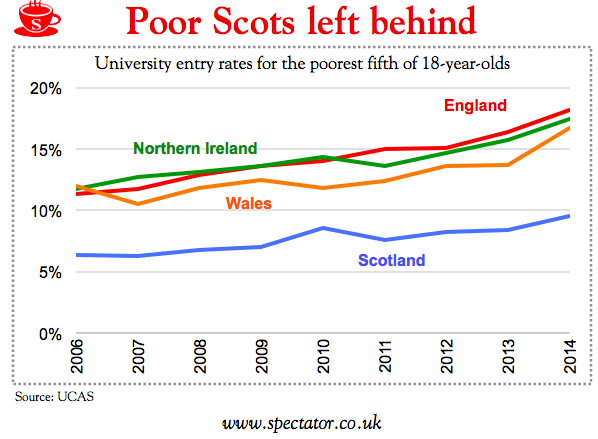At the SNP conference the First Minister and her deputy, John Swinney, both had precisely the same thing to say about university. Here’s Swinney:
“Students from a poorer background have never had a better chance of a place at university than under the SNP”.
And Nicola Sturgeon:
“More students from poorer backgrounds are now going to university”.
More. That’s the test they set: if more poor students are going to uni then the SNP is succeeding. They both talk about “university,” as distinct from other forms of further education. Yes, the ratio of poor kids at uni is rising in Scotland – but shamefully, it’s half the level of England. Worse, the gap is growing (see chart, above).
In fact, every part of the UK is increasing the number of poor students entering university – but everywhere, this happens at a faster rate than Scotland under the SNP (which took power in 2007). It’s a stunning failure, yet one that Swinney and Sturgeon seek to disguise as a success with their new verbal formula. In the rest of the UK, it’s taken for granted that more poorer students go to university – it’s not even mentioned in speeches. It seems that Swinney and Sturgeon have struck on a form of words designed to steer them through awkward interviews. And, perhaps, the 2016 Holyrood campaign.
This above graph irritates SNP supporters, who say it’s invalid because a higher proportion of Scots go to other further education colleges – and that Higher National Diplomas etc don’t show up in UCAS university figures. But does anyone seriously argue that ‘Higher National‘ qualifications and university degrees are equivalents? Few academics would be so bold as to say so, especially in the (many) cases where HN students don’t progress to a degree afterwards.
If the First Minister and her deputy want to talk about poor students going to “university” as opposed to further education colleges, they must confront the basic fact that if you’re poor and Scottish you’re half as likely to go to university as you are if you’re poor and English.
It’s an appalling state of affairs, and one I hope they’ll be held to account for when they try out their new line in broadcast interviews.







Comments